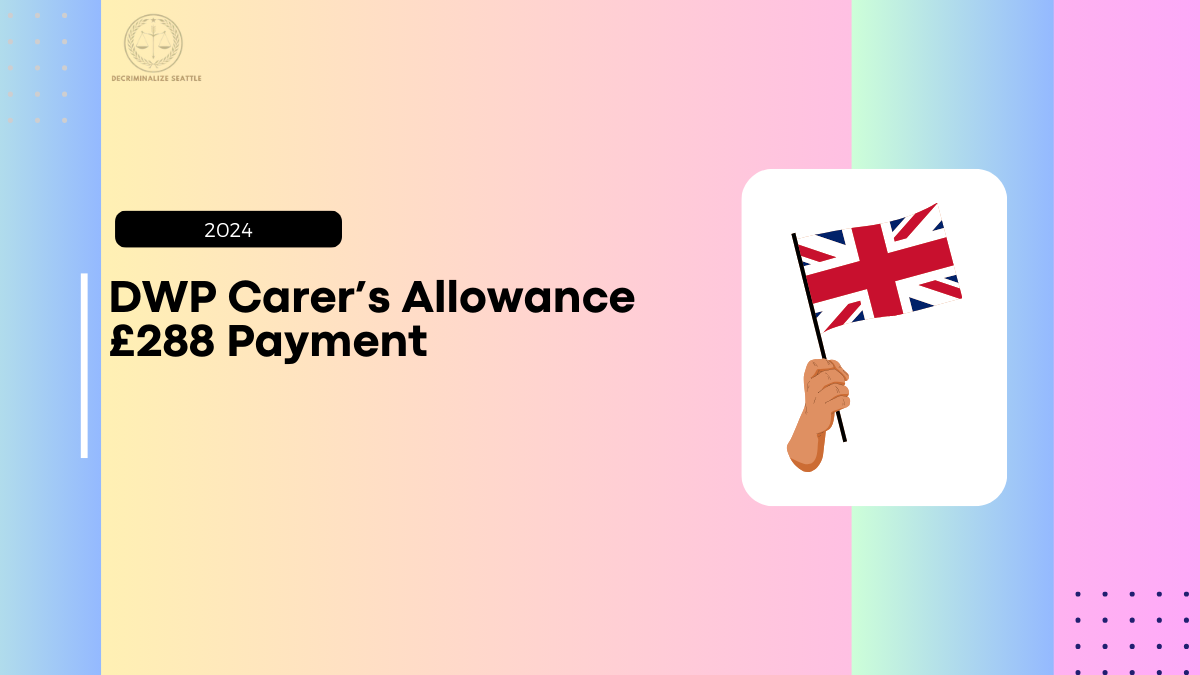The Department for Work and Pensions (DWP) has introduced a supplementary Carer’s Allowance payment of £288. This one-time payment provides financial assistance to carers who dedicate a significant portion of their time to looking after someone with substantial care needs. The goal is to ease carers’ financial strain while managing their caregiving responsibilities. This payment is separate from the standard Carer’s Allowance, ensuring eligible carers receive extra support for their invaluable work.

DWP Carer’s Allowance £288 Payment
To qualify for Carer’s Allowance, you must meet several conditions related to your role as a carer, your income, and the needs of the person you care for. Below is a breakdown of the eligibility criteria:
The Person You Care For
The person receiving care must be on specific benefits that recognize their health or disability condition. These benefits include:
- Personal Independence Payment (PIP)
- Disability Living Allowance (DLA)
- Attendance Allowance
- Constant Attendance Allowance
- Armed Forces Independence Payment (AFIP)
It’s important to confirm that the person you care for is receiving one of these benefits, as this is essential for your eligibility for Carer’s Allowance.
What is the Payment Amount and its Schedule?
The standard Carer’s Allowance currently provides £76.75 per week. However, you must provide at least 35 hours of care per week to qualify. The recent £288 payment is an additional, one-off bonus to support carers during a particularly challenging financial period. The payment schedule for the £288 bonus may vary depending on the government’s rollout plans, but the Carer’s Allowance is typically paid weekly or every four weeks. The extra payment does not affect the standard weekly rate or the eligibility for Carer’s Allowance.
Shared Care Situations
If care responsibilities are shared between multiple carers, only one person can claim Carer’s Allowance for looking after the same person. This means that even if more than one carer provides the necessary hours, only one claim will be accepted by the DWP. It’s essential to agree on who will apply for the allowance to avoid rejection of claims.
Earnings Calculation
Your earnings as a carer are an important factor in determining your eligibility. To qualify for Carer’s Allowance, you must earn less than £139 per week after certain allowable deductions (e.g., taxes and pension contributions). If your earnings exceed this threshold, you may not be eligible for the payment, even if you meet other caregiving requirements. The DWP carefully assesses your income to determine whether you can still claim the allowance.
Non-Countable Earnings
Not all earnings count towards the £139 weekly threshold. Some forms of income, such as Pension Credit, Income Support, and certain employment benefits, are not considered when calculating your eligibility. Additionally, money spent on caring-related expenses like travel or specialist equipment can also be deducted from your earnings, lowering your countable income and potentially helping you meet the threshold.
Do You Get a State Pension or Pension Credit?
If you receive a State Pension, you may not be able to claim Carer’s Allowance in full due to the “overlapping benefits” rule. The same rule applies if you receive Pension Credit. However, you may still be eligible for a Carer’s Allowance supplement, which tops up your income to account for caregiving duties. It’s crucial to check whether your pension affects the amount you could receive through Carer’s Allowance to ensure you’re getting the appropriate benefits.
How to Apply for Carer’s Allowance?
Applying for Carer’s Allowance is a straightforward process, with both online and postal options available. The application process requires you to provide detailed information about yourself, your caring responsibilities, and the person you care for.
Online Application
The easiest and fastest way to apply is through the DWP’s online portal. To complete the application online, you will need to:
- Create a Government Gateway account if you don’t already have one.
- Provide personal details such as your National Insurance number and banking information.
- Include information about the person you care for, including their health or disability benefit details.
- Submit the form and any supporting documentation electronically.
The online application provides a quicker decision-making process, with regular updates via email or text message.
Postal Application
If you prefer to apply by post, you can download and print a Carer’s Allowance application form from the government website or request one by calling the Carer’s Allowance Unit. Once completed, the form should be sent to the address provided on the document. Be sure to include any required documentation, such as proof of earnings or care-related expenses, to avoid delays in processing.
While postal applications may take longer to process than online submissions, this method is still an option for those without internet access or who prefer paper-based forms.
Required Documents
When applying for Carer’s Allowance, whether online or by post, you will need to provide specific documents, including:
- Your National Insurance number
- The National Insurance number and details of the person you are caring for
- Bank or building society details for payments
- Proof of income and any deductible expenses
- Proof of care-related costs (if applicable)
These documents help verify your eligibility and ensure you meet the necessary criteria to receive the Carer’s Allowance and the £288 payment. To streamline the process, it’s essential to gather all the required information before applying.
Conclusion
The Carer’s Allowance, including the £288 supplementary payment, provides critical financial support to those caring for individuals with significant health or disability needs. Understanding the eligibility criteria, income calculations, and the application process is key to ensuring that carers receive the full range of benefits to which they are entitled. Whether applying online or by post, gathering the required documents and information ahead of time can help make the process smoother and more efficient.
Click here to know more.